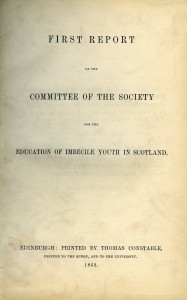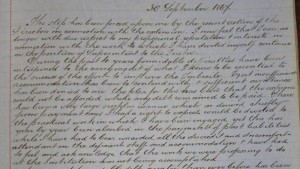This is the first of what will hopefully be a monthly series of blog posts on the progress of Continuity of Care – the project to catalogue and conserve the records of the Royal Scottish National Hospital. Thanks to a grant from the Wellcome Trust, this project started in the middle of August and will be completed by July 2015.
In 2013, the Royal Scottish National Hospital was given UNESCO status as a collection of international status (see our previous blog post). This reflects the importance of the Institution in the care of children with learning disabilities at a time when no distinction was made between mental disability and mental illness.
The Institution was founded in 1862 and the collection contains the earliest annual reports and minutes as well as a register of the first admissions.

Amongst the items of interest catalogued so far is a volume of Superintendent’s Reports 1863-1872.
The Medical Superintendent was in charge of the day to day running of the Institution and answered to the Directors. He submitted a monthly report in which he detailed admissions and discharges; the progress of building; donations and finance; requests for information from the Commissioners in Lunacy; recruitment and salaries of staff; and the health of the children. Dr David Brodie was the medical superintendent from 1862 to 1867 and he had a troubled relationship with the Directors. He had run a school for imbecile children in Edinburgh under the auspices of the Society for Education of Imbecile Youth in Scotland. Once the Society had the funds to build its Institution at Larbert, Brodie was the obvious choice as resident physician.
In Brodie’s second report he wrote ‘Seven pupils have been admitted during the month – one full payment, one reduced payment and 5 election cases’. But by his third report he was reporting that ‘the proportion of the uneducable class is already embarrassing and entails too heavy a trial on the patience of attendants…’ He made frequent requests for more staff and better accommodation and in his letter of resignation he made his feelings clear:

There has been a very large surplus revenue which as derived chiefly from payment cases I had a right to expect would be devoted to the practical work in which I have been engaged yet this has…been absorbed in the payment of past liabilities while I have had to bear unaided all the discredit and discomfort attendant on the deficient staff and accommodation and have had to feel and acknowledge that the work that we were professing to do at the Institution was not being accomplished’ (from the minutes of a Special Meeting of Directors 1st October 1867).
This tension between the needs of the Institution and the financial reality in which it operated was to continue throughout its history as later posts will illustrate.